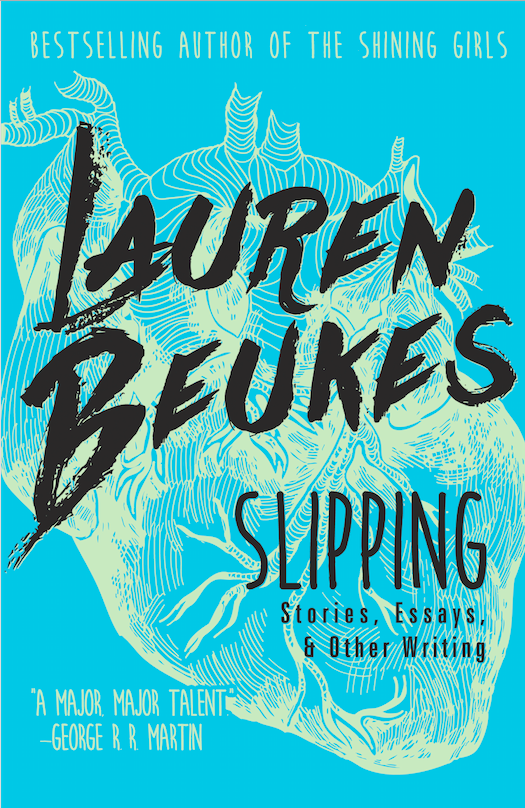With her novels Moxyland, Zoo City, The Shining Girls and Broken Monsters, Lauren Beukes has established herself as one of the genre’s most exciting voices. The stories assembled here not only show off her eclectic range of influences and interests, but the strength of her voice, her passion for her subjects, and that fantastic blend of anger, analysis, sensitivity and wit.
Several of the stories show an uncertain near future in which technology and humanity exist in an uneasy co-dependency. The titular ‘Slipping’ is the story of Pearl, a teenage athlete competing in an Olympic event in which the runners’ cybernetic enhancements are discussed more than their own skills. With her distrust of authority and personal belief system, Pearl’s struggle is her own.
Tech concerns come through with a more classic dystopian feel in sci-fi tales like ‘The Green,’ in which a bunch of grunts harvest terrifying flora and fauna for an uncaring corporation and may be worth more dead than alive, depending on what killed them. ‘Riding With The Dream Patrol’ is set in 2017 and finds journalist Lauren Beukes reporting on the government’s use of social media to monitor us, and doesn’t feel very sci-fi at all.
Several hallmarks of Beukes’ writing, such as her fascination with modern connectivity, the art world and the personas we create for ourselves, come through again and again in this collection. In ‘Pop Tarts,’ a reality star is forced into a violent and unwelcome crossover with another up and coming personality.
In ‘Exhibitionist’, a young artist shares floor space with a Cronenbergian living machine that may or may not feel pain. In the non-genre ‘Easy Touch,’ a front-man for one of those classic email scam collectives tries to guide an increasingly impatient woman through her final payment. One or two of the stories feel like they’re nudging up against each other, but they are in the minority.
There are stories that have no genre element at all, simply focusing on attempts at human connection, or on people facing unwanted attention. While she can certainly deliver delirious, pop-culture-strewn explosions of science fiction (we’re referring to ‘Unathi Battles The Black Hairballs,’ in which the titular character fights a gigantic hair monster in Tokyo before going on a very trippy journey involving performance art, talking cats and the infamous Suicide Forest), she is just as capable of giving us a vivid and strong character like Thozama, who tries to fend off a ‘helpful’ vigilante while carrying her produce to her shop in the excellent ‘Smileys’.
Couples come together and separate, stalkers are confronted with the grim facts of their behaviour, lonely people debate doing a Tom Ripley to their friends, and students learn to be more selfless by befriending teenage ghost girls. The best short story collections should feel like a treasure trove, a carefully curated present from the author to the reader. If you’re a fan of Beukes’ work, this is a gift.
